Satan Sabotaging the Sabbatōn
Published by Rob Skiba October 15, 2013 at 5:38 AM

A while back, I posted a note about the Sabbath, questioning whether or not we (Christians) should keep it. Of course, it stirred up no shortage of controversy and generated (at last count) over 600 responses. The usual arguments against keeping it involves a number of Scriptures about the Apostles meeting “on the first day of the week.” So, I decided to look into it beyond the usual defense, which typically involves the need to educate people on the fact that the Hebrew day begins at sunset (roughly between 6pm and 8pm). Thus, I’ve usually stated that as is the tradition, for thousands of years, people have closed out the Sabbath with family/community meals – hence the “breaking of bread” on “the first day of the week”, which by our reckoning would be Saturday evening at sunset. While this is certainly true, and generally a good explanation, I think I’ve actually stumbled upon a VAST conspiracy that may nullify the entire argument!
I have for a longggggg time known that translators invariably approach the text with personal bias. It also doesn’t help if you have – oh I don’t know – a tyrannical king (or emperor) breathing down your neck, wanting to insure his views are supported by the translation. I’ve also known that since the days of Marcion, the former pagan Gentiles who converted to Christianity did just about all they could to eliminate as much “Jewish” tradition as they possibly could from their faith (which resulted in a massive departure from the things of YHWH). I’ve stated time and time again that NO English translation is perfect. We must always compare and consult the original languages. Well… until now, I had not done so with regard to the “first day of the week” issue.
It is no secret that there are MANY English words added to our Scriptures – sometimes out of necessity, other times out of deliberate choice. The KJV, NASB and a few others are generally kind enough to indicate when they have done this by putting the words in italics. Well… guess what? The word “day” shows up in italics in all of the examples used for “first day of the week.” That wouldn’t be so bad until you realize that the Greek word for “week” is translated from “sabbatōn”. But “sabbatōn” is NOT the Greek word for “week”! Check this out:
I decided to do a few tests on Google Translate. These were the results:


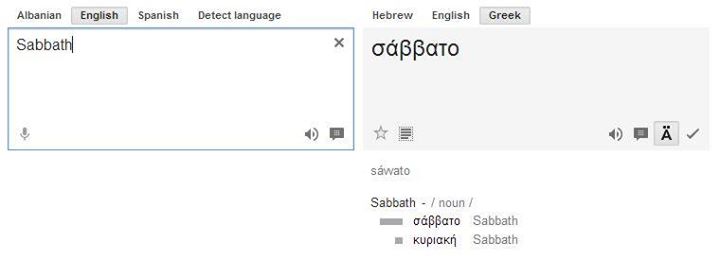
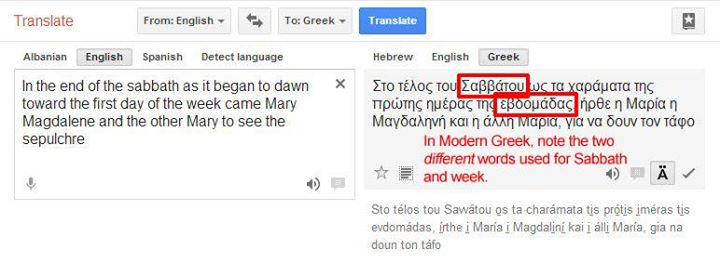
The Greek word for “Sabbath” is Σαββάτου. The word for “week” is εβδομάδας – two totally different words! Now, I do not know Greek, so take this information for whatever it’s worth. I freely confess that I am not an expert in this area, and I’m searching this out. I encourage you to do the same.
Some may argue that modern Greek is not the same as the ancient Greek of the first century. OK fine. Let’s look at the ancient Greek then. In fact, let’s go way back and take Genesis 29:28 for instance:
Genesis 29:28 And Jacob did so, and fulfilled her week: and he gave him Rachel his daughter to wife also.
Using an on-line tool to show me the English, Hebrew and Greek rendering (color coded), this is what I found:

That’s not “sabbatōn” used there for “week”. OK. Now, let’s look at the Scriptures in question. A quick Bible search gives us:
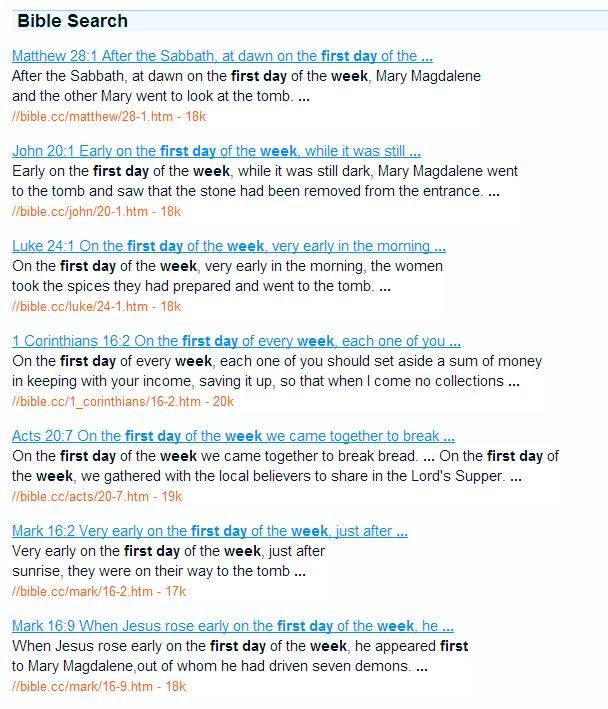
Below are a number of examples, showing how “first day of the week” is rendered in the KJV (pay close attention to the way “sabbatōn” is interchangably translated). To set the stage, let’s first look at a perfect example to see how Sabbath [sabbatōn] is properly translated:
Mark 2:27 And he said unto them, The sabbath was made for man, and not man for the sabbath:
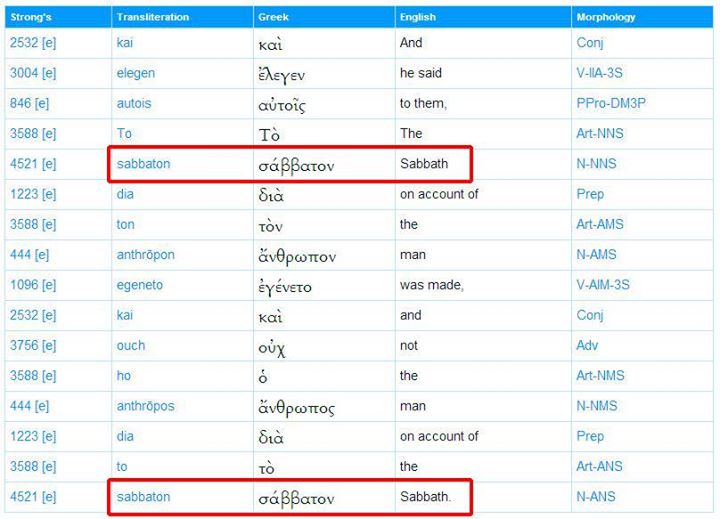
Got it? Sabbath is “sabbatōn” – that is until you see our English tranlsations talking about Yeshua’s resurrection:
Matthew 28:1 In the end of the sabbath, as it began to dawn toward the first day of the week, came Mary Magdalene and the other Mary to see the sepulchre.
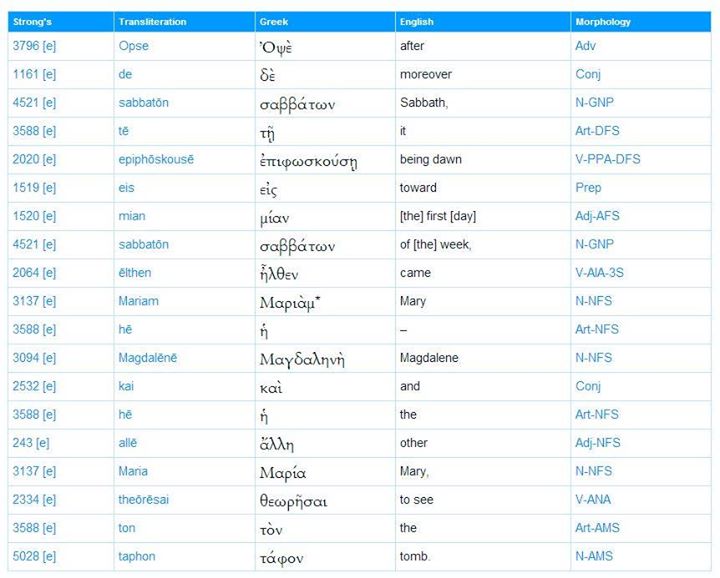
Mark 16: 2 And very early in the morning the first day of the week, they came unto the sepulchre at the rising of the sun.
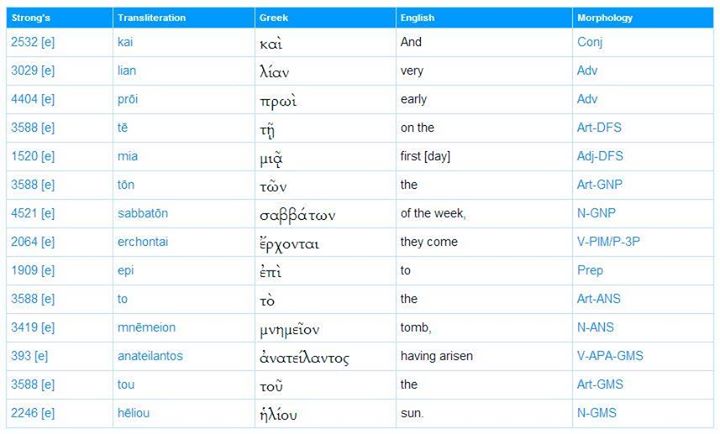
Mark 16:9 Now when Jesus was risen early the first day of the week, he appeared first to Mary Magdalene, out of whom he had cast seven devils.
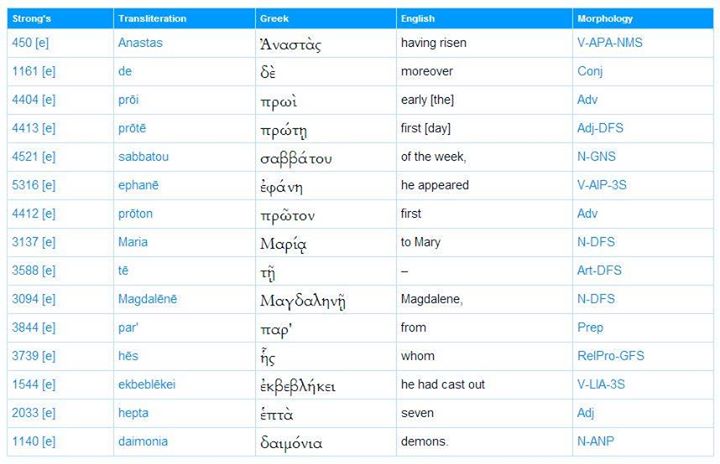
Luke 24:1 Now upon the first day of the week, very early in the morning, they came unto the sepulchre, bringing the spices which they had prepared, and certain others with them.
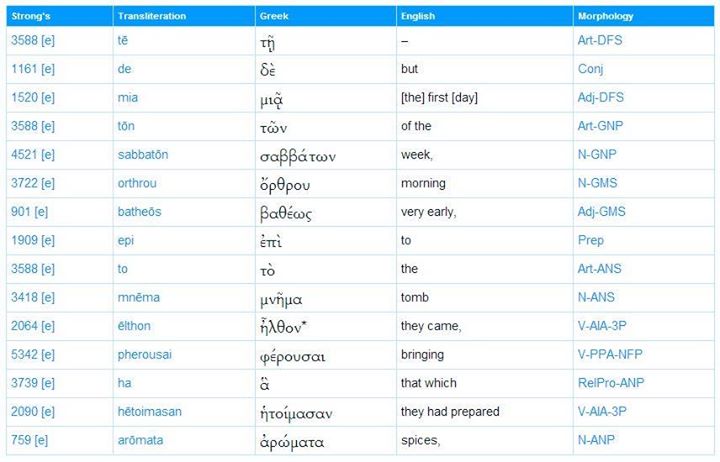
John 20:1 The first day of the week cometh Mary Magdalene early, when it was yet dark, unto the sepulchre, and seeth the stone taken away from the sepulchre.
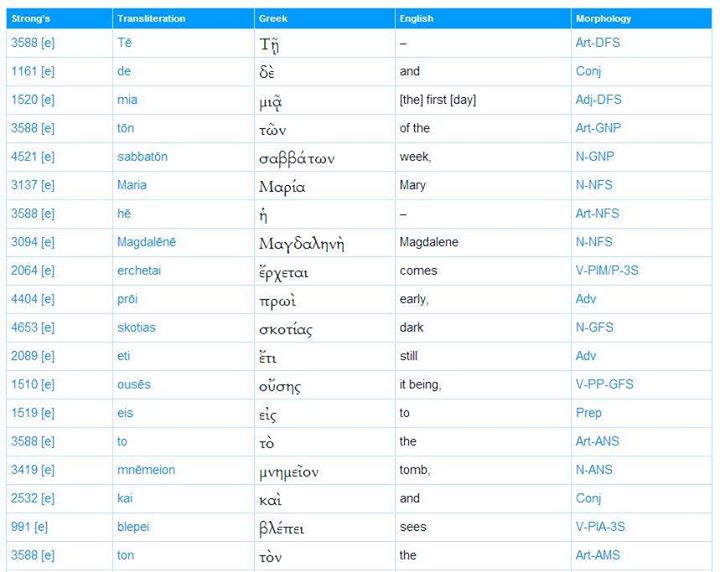
Acts 20:7 And upon the first day of the week, when the disciples came together to break bread, Paul preached unto them, ready to depart on the morrow; and continued his speech until midnight.
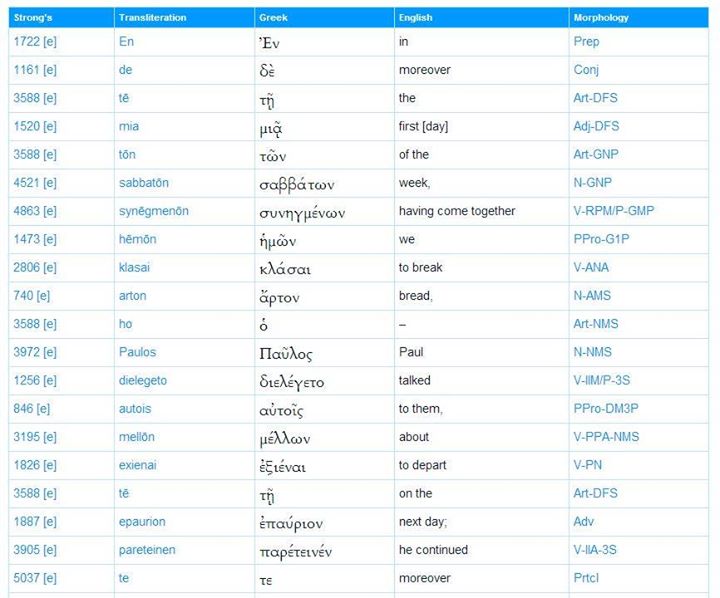
1 Corinthians 16:2 Upon the first day of the week let every one of you lay by him in store, as God hath prospered him, that there be no gatherings when I come.
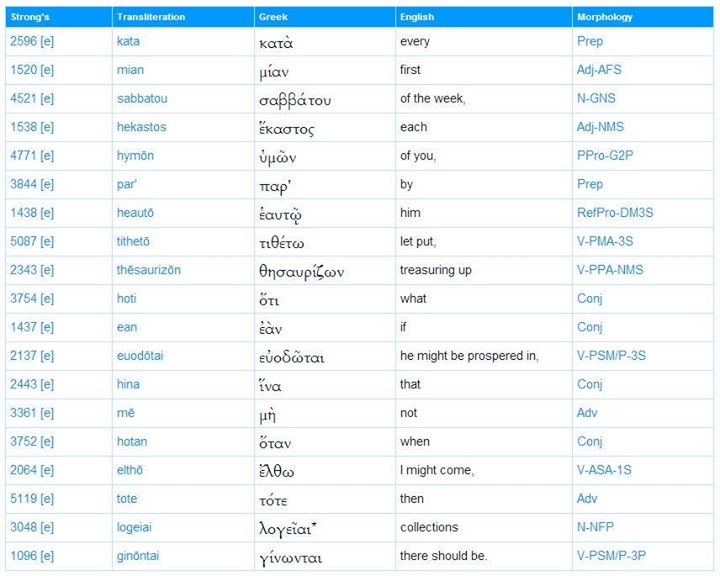
Starting to see a pattern here? The word “day” is consistently MISSING from the text. And the word translated for “week” is mistranslated from “sabbatōn” which is otherwise rendered as Sabbath!
Don’t believe me? Elsewhere, when the word “week” would be in order, we see a different rendering:
Acts 28:14 There we found some brothers and sisters who invited us to spend a week with them. (NIV)
Acts 28:14 Where we found brethren, and were desired to tarry with them seven days: and so we went toward Rome. (KJV)
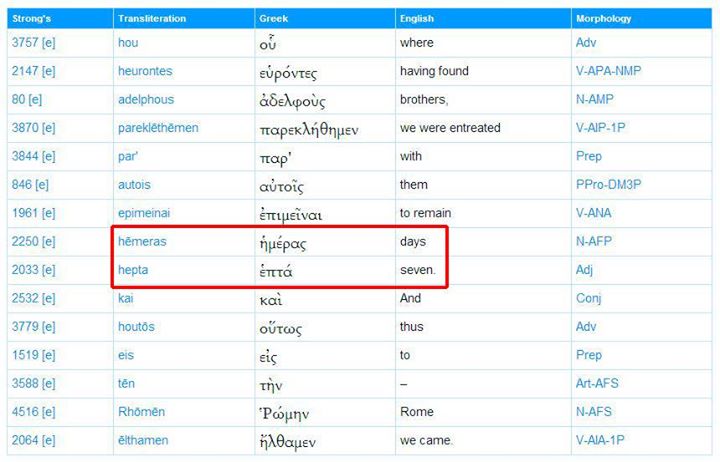
What happened to the familiar use of “sabbatōn” for week that we saw over and over and over again in reference to Yeshua’s resurrection and the meeting time of the the Apostles??
Oddly enough, we see that PAUL taught on the Sabbath in quite a number of places in the book of Acts. Paul was a Sabbath keeper. And the translators got it right in all of the translations I looked at:
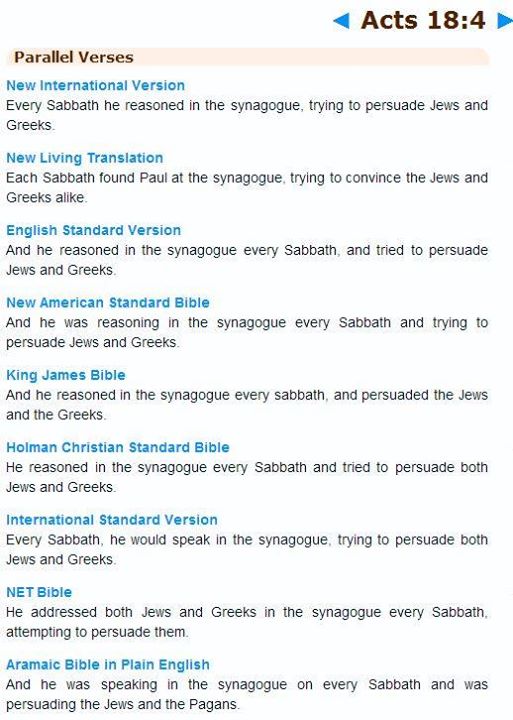
In each case, properly translating “sabbatōn” as Sabbath:
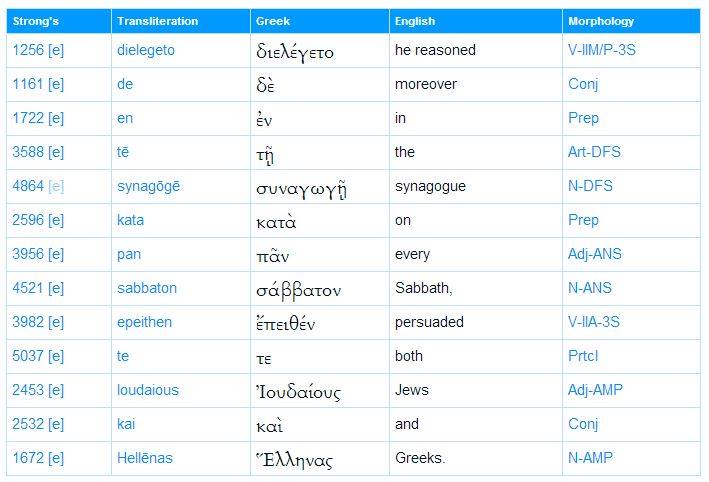
But you do see some other distortions elsewhere, such as here in Yeshua’s parable of the Pharisee and the Tax Collector, concerning the bragging of the Pharisee:
Luke 18:12 I fast twice in the week, I give tithes of all that I possess. (KJV)
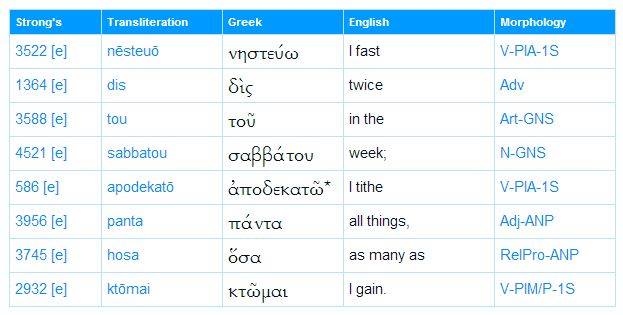
This is yet another reason why I say comparing translations is extremely useful. Consider what may be a far better translation, consistent with the actual words used:
Luke 18:12 I fast two meals every sabbath; I give tithes of all that I possess. (Jubilee Bible 2000)
A proper translation changes the whole meaning: fasting twice on the Sabbath vs twice a week.
I’m finding that there is much in our English Bible(s) that has been seriously distorted by Gentile thinking and an agenda to strip away the Hebrew heritage of the Scriptures. We must remember that the Scriptures written by Hebrews, largely for Hebrews, in a Hebrew mindset, that was always 100% in agreement with the “Bible of the Bible” that was the Torah. In the Torah, we see that YHWH is very orderly. He does stuff on His “appointed times” illustrated for us in the Feasts. Leviticus 23 gives us the rundown on how they are to be counted. Within them, are specified days. Once you realize that, you see that Yeshua was doing stuff on those days. Because they are so specific, we cannot translate the text any old way. For instance, some translations rounded down to a “week” when the text clearly said “eight days”, which is more than a week, and probably there for a significant reason:
John 20:26 And after eight days again his disciples were within, and Thomas with them: then came Jesus, the doors being shut, and stood in the midst, and said, Peace be unto you. (KJV)
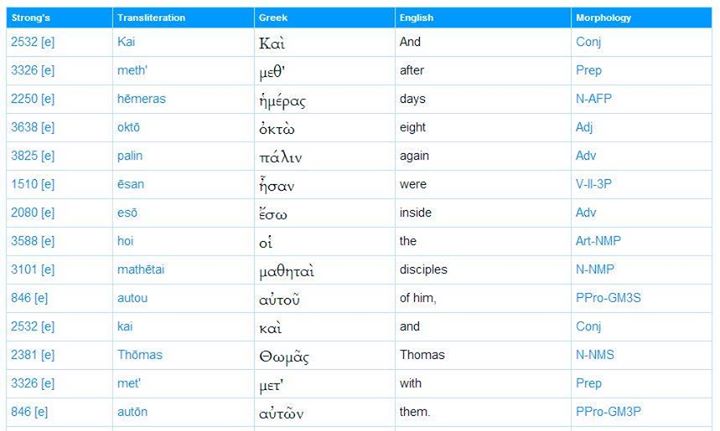
There the KJV gets it right, but the NIV blows it:
John 20:26 A week later his disciples were in the house again, and Thomas was with them. Though the doors were locked, Jesus came and stood among them and said, “Peace be with you!” (NIV)
(NOTE: The International Standard Version, God’s Word Translation and Weymouth New Testament translations all missed it too).
It’s not just the Greek that gets distorted. The same problem (concerning translations related to the Sabbath) comes up in the Hebrew. Take Isaiah 66:23 for instance:
Isaiah 66:23 And it shall come to pass, that from one new moon to another, and from one sabbath to another, shall all flesh come to worship before me, saith the LORD. (KJV)
The KJV gets it right. The Hebrew for Sabbath is “šab·bāṯ”
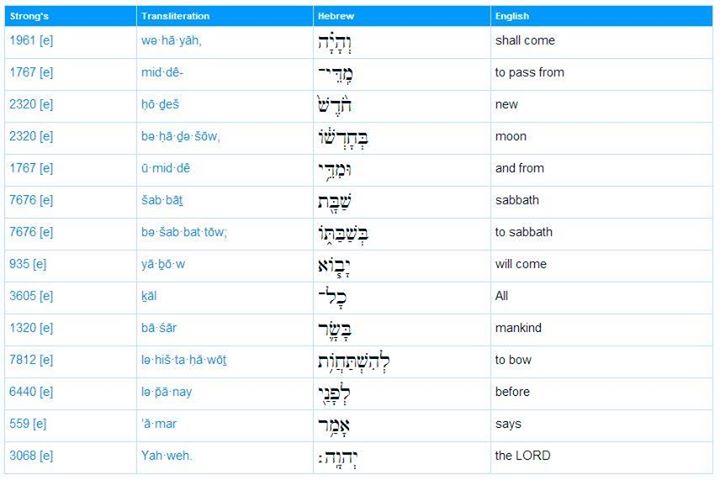
Most English translations get it right, but the God’s Word Translation fails:
Isaiah 66:23 From one month to the next and from one week to the next all people will come to worship me,” declares the LORD. (God’s Word Translation)
While I do study from the KJV, and have since I was 7 years old, perhaps one of the biggest beefs I have with it (aside from replacing the name of YHWH over 6,000 times with the generic title, “LORD”) is the absolutely bogus rendering of the word “Easter” in Acts 12:4.
Acts 12:4 And when he had apprehended him, he put him in prison, and delivered him to four quaternions of soldiers to keep him; intending after Easter to bring him forth to the people. (KJV)
This is a bit off topic, but it simply should not be there! No other translation that I’ve looked at has it.
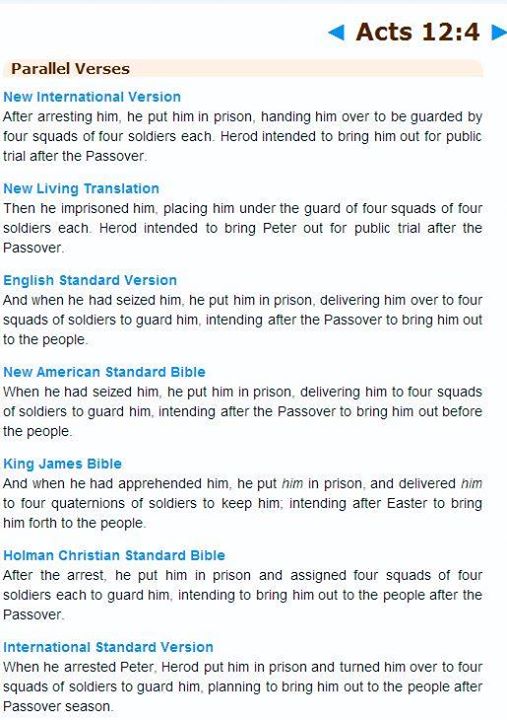
Only the KJV (and the newer versions of it) uses “Easter” instead of YHWH’s appointed time, which comes from the Greek word “pascha” – rendered everywhere else as Passover:
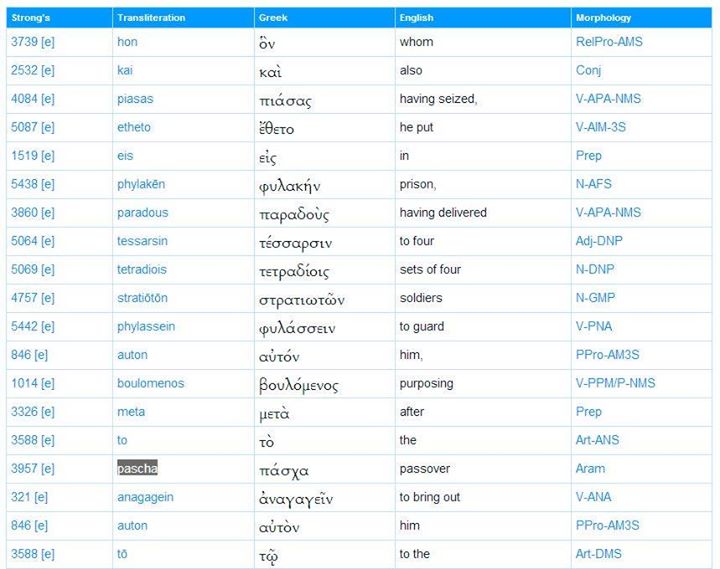
Again, this is why I say we must compare translations and go back to the original languages for verification. The KJV clearly does not get it “right” all the time, and neither do any of the others. We don’t have to know/speak Hebrew, Aramaic or Greek. We just need to know how to use the wide range of Bible tools available to us, which enable us to see what’s lying under the English text.
Now, concerning the Sabbath, I’d say that Satan did a very good job of sabotaging it. The text is clear. The Apostles met on the Sabbath (7th day) – including Paul. They all “Remembered the Sabbath day and kept it holy.” Who distorted it? The Catholic Church!
Paul said, “Imitate me as I imitate Christ.” (1 Corinthians 11:1)
Jesus kept the Sabbath and repeatedly taught on the Sabbath:
And when the Sabbath had come, He began to teach in the synagogue (Mark 6:2).
So He came to Nazareth, where He had been brought up. And as His custom was, He went into the synagogue on the Sabbath day, and stood up to read (Luke 4:16).
Now it happened on another Sabbath, also, that He entered the synagogue and taught (Luke 6:6).
Now He was teaching in one of the synagogues on the Sabbath (Luke 13:10).
Then He went down to Capernaum, a city of Galilee, and was teaching them on the Sabbaths (Luke 4:31).
Acts 13:42-44 shows what Paul kept the Sabbath [sabbaton] too:
…the Gentiles begged that these words might be preached to them the next Sabbath. Now when the congregation had broken up, many of the Jews and devout proselytes followed Paul and Barnabas, who, speaking to them, persuaded them to continue in the grace of God. On the next Sabbath almost the whole city came together to hear the word of God.
Notice that teaching on the Sabbath [sabbaton] was his custom:
1 Now when they had passed through Amphipolis and Apollonia, they came to Thessalonica, where there was a synagogue of the Jews. 2 Then Paul, as his custom was, went in to them, and for three Sabbaths reasoned with them from the Scriptures, 3 explaining and demonstrating that the Christ had to suffer and rise again from the dead, and saying, “This Jesus whom I preach to you is the Christ.” 4 And some of them were persuaded; and a great multitude of the devout Greeks, and not a few of the leading women, joined Paul and Silas. (Acts 17:1-4)
Also Acts 18:4 states,
And he reasoned in the synagogue every Sabbath, and persuaded both Jews and Greeks.
NO Jew would be meeting on Sunday in the synagogue. Both Jews and Greeks were there on the 7th day Sabbath. Hence the New Testament is clear that Paul kept the Sabbath, regularly preached on the Sabbath, speaking to both Jews and Greeks on the Sabbath, which is, always was and always will be on the 7th day:
Then God blessed the seventh day and sanctified it, because in it He rested from all His work which God had created and made (Genesis 2:3)
For in six days the LORD made the heavens and the earth, the sea, and all that is in them, and rested the seventh day. Therefore the LORD blessed the Sabbath day and hallowed it (Exodus 20:11).
If you turn away your foot from the Sabbath, From doing your pleasure on My holy day, And call the Sabbath a delight, The holy day of the LORD honorable (Isaiah 58:13
That’s what the Bible says. But the Catholic Church says:
“It is well to remind the Presbyterians, Baptists, Methodists, and all other Christians, that the Bible does not support them anywhere in their observance of Sunday. Sunday is an institution of the Roman Catholic Church, and those who observe the day observe a commandment of the Catholic Church.” Priest Brady, in an address, reported in the Elizabeth, NJ ‘News’ on March 18, 1903.
“Protestants … accept Sunday rather than Saturday as the day for public worship after the Catholic Church made the change… But the Protestant mind does not seem to realize that … in observing Sunday, they are accepting the authority of the spokesman for the Church, the pope.” Our Sunday Visitor, February 5th, 1950.
“Deny the authority of the Church and you have no adequate or reasonable explanation or justification for the substitution of Sunday for Saturday in the Third – Protestant Fourth – Commandment of G-d… The Church is above the Bible, and this transference of Sabbath observance is proof of that fact.’’ Catholic Record, September 1, 1923.
“Of course these two old quotations are exactly correct. The Catholic Church designated Sunday as the day for corporate worship and gets full credit – or blame – for the change.” This Rock, The Magazine of Catholic Apologetics and Evangelization, p.8, June 1997
‘The [Roman Catholic] Church changed the observance of the Sabbath to Sunday by right of the divine, infallible authority given to her by her founder, Jesus Christ. The Protestant claiming the Bible to be the only guide of faith, has no warrant for observing Sunday. In this matter the Seventh-day Adventist is the only consistent Protestant.’’ The Catholic Universe Bulletin, August 14, 1942, p. 4.
“… you may read the Bible from Genesis to Revelation, and you will not find a single line authorizing the sanctification of Sunday. The Scriptures enforce the religious observance of Saturday, a day which we never sanctify.” The Faith of Our Fathers, by James Cardinal Gibbons, Archbishop of Baltimore, 88th edition, page 89. Originally published in 1876, republished and Copyright 1980 by TAN Books and Publishers, Inc., pages 72-73.
“Perhaps the boldest thing, the most revolutionary change the Church ever did, happened in the first century. The holy day, the Sabbath, was changed from Saturday to Sunday. “The Day of the Lord” (dies Dominica) was chosen, not from any directions noted in the Scriptures, but from the Church’s sense of its own power. The day of resurrection, the day of Pentecost, fifty days later, came on the first day of the week. So this would be the new Sabbath. People who think that the Scriptures should be the sole authority, should logically become 7th Day Adventists, and keep Saturday holy.” Sentinel, Pastor’s page, Saint Catherine Catholic Church, Algonac, Michigan, May 21, 1995
Satan used the Roman Catholic Church to sabotage the Sabbath. The evidence for this fact is overwhelming – perhaps even more so now after seeing the Greek for myself. Do what you will with this information. As for me and my house, we’re going back to the true meaning of sabbatōn.
Blessings and Shalom.
– Rob Skiba
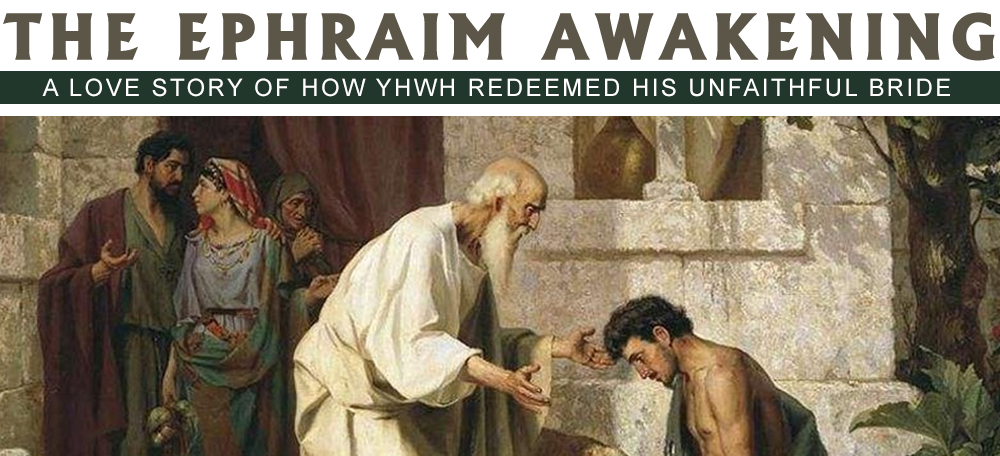



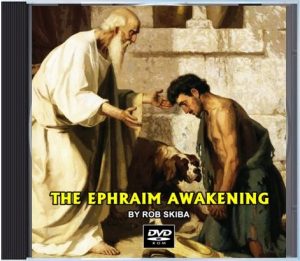


Leave a Reply